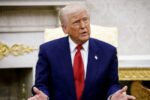All eyes are on Wednesday as the trade hostilities that U.S. President Donald Trump has started intensify.
With pledges to impose a series of tariffs, or fees on imports from other nations, that he claims will eliminate the United States’ dependency on foreign goods, Trump has referred to April 2 as “Liberation Day” on multiple occasions.
Trump has stated that in order to do this, he will apply “reciprocal” tariffs, which would equal the charges that other nations impose on goods made in the United States.
However, there are still many questions over the real implementation of these levies.
Trump will reveal his plans to impose reciprocal tariffs on almost all U.S. trading partners on Wednesday, according to White House press secretary Karoline Leavitt, who insisted that the president should make the final announcement.
Trump has demonstrated aggressiveness in threatening tariffs since taking office a few months ago, all the while inciting a sensation of whiplash through intermittent trade steps. Additionally, there may be more misunderstandings or delays this week.
According to Trump, tariffs shield American businesses from unfair foreign competition, provide revenue for the federal government, and give it the power to pressure other nations into making concessions.
However, analysts emphasize that widespread tariffs at Trump’s proposed rates might backfire.
This is what you should know:
What is scheduled for April 2nd?
The specifics of Trump’s intentions are still unknown. Product-by-product duties, more general “averages” applied to all goods from each nation, or perhaps something else entirely could be the form of reciprocal tariffs.
The prices may be comparable to those in other nations, taking into account their value-added taxes and subsidies for domestic businesses.
Peter Navarro, the White House’s trade adviser, stated on “Fox News Sunday” that the tariffs may increase revenue by $600 billion a year, or 20% on average.
Trump has discussed imposing these taxes on a number of nations, including the European Union, South Korea, Brazil, and India.
Leavitt said Monday that Trump’s aides had given him a number of proposals. She went on to say that although the president would ultimately decide, no nationwide tariff exemptions were currently being considered.
Long-delayed import levies may shortly be implemented. For instance, Trump’s one-month hold on a number of products from Canada and Mexico is scheduled to end in early April.
Trump stated earlier this month on his social media account Truth Social that the U.S.-Mexico-Canada Agreement’s prolongation for Mexican imports expires on April 2.
However, since then, no additional confirmation on a certain date has been provided.
Which of Trump’s tariffs is set to go into effect soon?
In addition to enacting fresh tariffs on the South American nation, Trump has stated that he will impose a 25% duty on all imports from any nation that purchases gas or oil from Venezuela, including the United States, beginning Wednesday.
His 25% auto import tariffs will go into effect on Thursday, and at midnight, taxes on fully imported vehicles will begin to be collected. In the upcoming weeks, through May 3, the tariffs are expected to be extended to relevant vehicle parts.
Economists emphasize that this trade action will disrupt the global supply chain of the auto industry and result in higher prices for consumers, despite the White House’s claim that it intends to generate $100 billion in revenue yearly from these additional penalties.
Controversial Move: Trump Administration Creates Registry for Unauthorized Immigrants
Which tariffs are currently in force?
Beginning on February 4, Trump levied a 10% duty on all imports from China, which he later raised to 20% on March 4.
And China has responded with retaliatory tariffs on a variety of American goods, such as a 10% tariff on U.S. crude oil that went into effect on February 10 and a 15% tax on coal and liquefied natural gas products.
Beginning March 10, China also levied duties of up to 15% on important agricultural shipments from the United States.
Earlier this month, Trump’s increased tariffs on steel and aluminum also went into force.
With Trump’s order to eliminate steel exemptions and increase aluminum’s levy from his previously imposed 2018 import taxes going into force on March 12, both metals are now subject to a 25% overall tax.
The two biggest trading partners of the United States, Canada and Mexico, have also been subject to high tariffs.
Trump imposed a partial, month-long postponement of his 25% tariffs on both nations earlier this month, suspending levies on imports connected to automobiles and items that adhere to the 2020 US-Mexico-Canada Agreement until early April.
Will there be more tariffs in the future?
Trump is likely to impose additional tariffs, and he has threatened to impose import fees on goods including computer chips, lumber, copper, and pharmaceutical medications.
Furthermore, a number of nations, including Canada, have threatened or even implemented retaliatory actions.
Although Trump has stated that his 25% vehicle import levies will be permanent, he has stated that he will not engage in negotiations with other nations on Wednesday’s tariffs until after they are put into effect.
The European Union proposed penalties on U.S. imports worth about 26 billion euros ($28 billion) in retaliation to Trump’s steel and aluminum tariffs. These measures target not just steel and aluminum products but also American beef, poultry, bourbon, motorcycles, peanut butter, and jeans.
The 27-member bloc had previously stated that it will postpone the implementation of this retaliatory trade action until mid-April, without providing a specific date. The original plan was to implement it in two stages, on Tuesday and April 13.
additional retaliatory measures might be made this week, especially if Trump discloses additional specifics of broad reciprocal tariffs on Wednesday.
This information has been sourced from apnews.







Leave a Comment